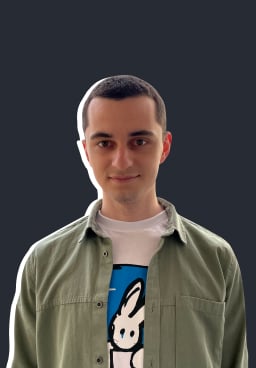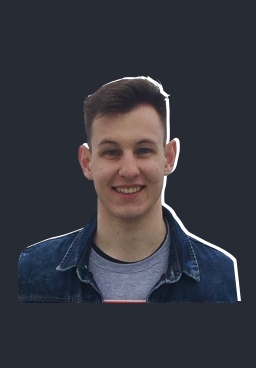Intro to IT is a free educational program introduced by LeverX for those who want to start a career in IT
We are here to fight your fears and break popular stereotypes, such as:

Intro to IT Is Your Path to Changes
Many IT courses have strict requirements for their students. But the only requirement we have is your desire to obtain new knowledge and develop as a professional.
APPLY FOR OUR EDUCATIONAL PROGRAM IF YOU:

We Know How to Help You
Intro to IT is more than an attempt to show you that working in IT is cool. We want to help you realize your potential in a new profession, and we know how to do it
After the program, you will:
- Better understand the specifics of the IT world
- Learn what technical and communication skills you should have to work in IT
- Get the base needed for further development in IT

LeverX in Figures
LeverX consists of two divisions: LeverX and Emerline. More than 1600 employees work here today. The company's offices are located in the USA, Germany, Poland, Lithuania, the UK, United Arab Emirates, Kazakhstan, and Uzbekistan. The corporate headquarters is located in Miami, Florida.
year of establishment
new employees during 2021
successful projects
employees
YEARS OF EXPERIENCE
YEARS is the average age of employees
offices in 9 countries

LeverX is an SAP Global Strategic Supplier for Technical Services and a full-cycle service provider with 19 years of close collaboration with SAP. LeverX is an SAP Gold Partner.
Among the SAP solutions, we are working with are: SAP S/4HANA, TM, EWM, IBP, CRM, PLM, PP/DS, BI, and many others. LeverX is a part of SAP AppHaus Network, where we are ready to provide Design Thinking sessions aimed at finding the best solutions to meet current business needs.









THE PROGRAM of “INTRO TO IT”
1
Lecture #1 — Entry to IT. Introduction lesson
- The history of LeverX and overview of company projects.
- Ways of development of specialists in IT. Specialist levels: Junior, Middle, Senior.
- Stories of company employees who enter IT from other areas.
- The structure of lectures and criteria for assessing knowledge.
The speaker is Dzmitry Buriak, Software Engineer.
2
Lecture #2 — Application development life cycle
- What is project development?
- Development stages: analysis, design, development, testing, release.
- Who is involved in the development: the roles and responsibilities of specialists.
- Review of modern programming languages and technologies.
- Programmer's tools.
The speaker is Siarhei Valenda, Software Engineer.
3
Lecture #3 — Logic operations and algorithms
- What are logical operations?
- Types of logical operations.
- Algorithms and their properties.
- Types of algorithms.
- The importance of logical operations and algorithms in developing application business logic.
The speaker is Viktoryia Shyrokaya, Software Engineer
4
Lecture #4 — Data: types and structures
- What is data in programming?
- Data types.
- Basic methods for working with various data types.
- The concept of an object.
- The concept of data structure.
- Types of data structures.
The speaker is Siarhei Bahamiaka, Software Engineer
5
Lecture #5 — Application business logic programming fundamentals
- What are cycles, and what are they for?
- Loop types and use cases.
- Branches, their types, and use cases.
- Functions: what are they for, and how to use them.
The speaker is Viktoryia Shyrokaya, Software Engineer
6
Lecture #6 — User interface
- Сreation of the user interface.
- User interaction with the business logic of the application.
- Display the results of an operation called by the user at the interface level.
- Handling errors in the business logic of the application.
The speaker is Aliaksei Paverany, Software Engineer
7
Lecture #7 — Development quality
- The role of testing in development.
- Types of testing.
- Testing tools in terms of code.
- Quality, code style, and good practices.
The speaker is Siarhei Bahamiaka, Software Engineer
8
Lecture #8 — Application development: a real-life example
- Work with the functional requirements for the application.
- Planning, decomposition, and development evaluation.
- Writing a basic application from scratch.
- Preparing for testing.
The speaker is Aliaksei Paverany, Software Engineer
1
Lecture #1 — Entry to IT. Introduction lesson
- The history of LeverX and overview of company projects.
- Ways of development of specialists in IT. Specialist levels: Junior, Middle, Senior.
- Stories of company employees who enter IT from other areas.
- The structure of lectures and criteria for assessing knowledge.
The speaker is Dzmitry Buriak, Software Engineer.
2
Lecture #2 — Application development life cycle
- What is project development?
- Development stages: analysis, design, development, testing, release.
- Who is involved in the development: the roles and responsibilities of specialists.
- Review of modern programming languages and technologies.
- Programmer's tools.
The speaker is Siarhei Valenda, Software Engineer.
3
Lecture #3 — Logic operations and algorithms
- What are logical operations?
- Types of logical operations.
- Algorithms and their properties.
- Types of algorithms.
- The importance of logical operations and algorithms in developing application business logic.
The speaker is Viktoryia Shyrokaya, Software Engineer
4
Lecture #4 — Data: types and structures
- What is data in programming?
- Data types.
- Basic methods for working with various data types.
- The concept of an object.
- The concept of data structure.
- Types of data structures.
The speaker is Siarhei Bahamiaka, Software Engineer
5
Lecture #5 — Application business logic programming fundamentals
- What are cycles, and what are they for?
- Loop types and use cases.
- Branches, their types, and use cases.
- Functions: what are they for, and how to use them.
The speaker is Viktoryia Shyrokaya, Software Engineer
6
Lecture #6 — User interface
- Сreation of the user interface.
- User interaction with the business logic of the application.
- Display the results of an operation called by the user at the interface level.
- Handling errors in the business logic of the application.
The speaker is Aliaksei Paverany, Software Engineer
7
Lecture #7 — Development quality
- The role of testing in development.
- Types of testing.
- Testing tools in terms of code.
- Quality, code style, and good practices.
The speaker is Siarhei Bahamiaka, Software Engineer
8
Lecture #8 — Application development: a real-life example
- Work with the functional requirements for the application.
- Planning, decomposition, and development evaluation.
- Writing a basic application from scratch.
- Preparing for testing.
The speaker is Aliaksei Paverany, Software Engineer
program info








